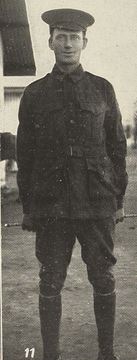
MCNEILL, David James
| Service Number: | 4062 |
|---|---|
| Enlisted: | 30 August 1915 |
| Last Rank: | Lance Corporal |
| Last Unit: | 47th Infantry Battalion |
| Born: | Orford, Tasmania, Australia, 20 September 1883 |
| Home Town: | Hobart, Tasmania |
| Schooling: | Not yet discovered |
| Occupation: | Labourer |
| Died: | Killed in action, France, 31 August 1916, aged 32 years |
| Cemetery: |
No known grave - "Known Unto God" Villers-Bretonneux Memorial, Villers-Bretonneux, Picardie, France |
| Memorials: | Australian War Memorial Roll of Honour, Hobart Roll of Honour, Spring Bay District War Memorial |
World War 1 Service
| 30 Aug 1915: | Enlisted AIF WW1, Private, 4062, 15th Infantry Battalion | |
|---|---|---|
| 24 Nov 1915: | Involvement Private, 4062, 15th Infantry Battalion, --- :embarkation_roll: roll_number: '11' embarkation_place: Melbourne embarkation_ship: RMS Orontes embarkation_ship_number: '' public_note: '' | |
| 24 Nov 1915: | Embarked Private, 4062, 15th Infantry Battalion, RMS Orontes, Melbourne | |
| 9 Mar 1916: | Transferred AIF WW1, Private, 47th Infantry Battalion | |
| 9 Aug 1916: | Promoted AIF WW1, Lance Corporal, 47th Infantry Battalion |
Help us honour David James McNeill's service by contributing information, stories, and images so that they can be preserved for future generations.
Add my storyBiography contributed by Faithe Jones
Son of Helen and the late Joseph McNeill.
Biography contributed by Stephen Brooks
David James McNeill was the son of Helen and the late Joseph McNeill, his father passing away in 1910. His younger brother, 14713 Spr. Alan Douglas McNeill 1st Field Company Australian Engineers was later killed in action in Belgium on 26 March 19188, aged 27.
A mate, Sergeant Drew wrote to Mrs McNeill of 18 Little Arthur Street, North Hobart, giving details of how her son met his death, which was published in the Launceston Examiner,
“Enclosed please find a few private belongings of your son Dave. I send, not to reopen a wound, but because I thought you would like to know how your son died. He was on duty, observing in the front-line trench, near Mouquet Farm, at 6 am, on September 1, 1916, and I was standing two yards from him, also observing, when a German shell came. He did not suffer, as death was instantaneous. My own escape was very narrow, but it was not my turn, his death was a great shock to me, as he was a personal friend of mine. I have been his platoon sergeant ever since he left Tasmania, and there was no better soldier or straighter man in the Australian army. He was a general favourite with all the rest of the company, and the men would have gone anywhere with him. He could have gained stripes, but was too modest to take them, and refused several times. However, I persuaded him recently to take one, and he was lance-corporal at the last.”










